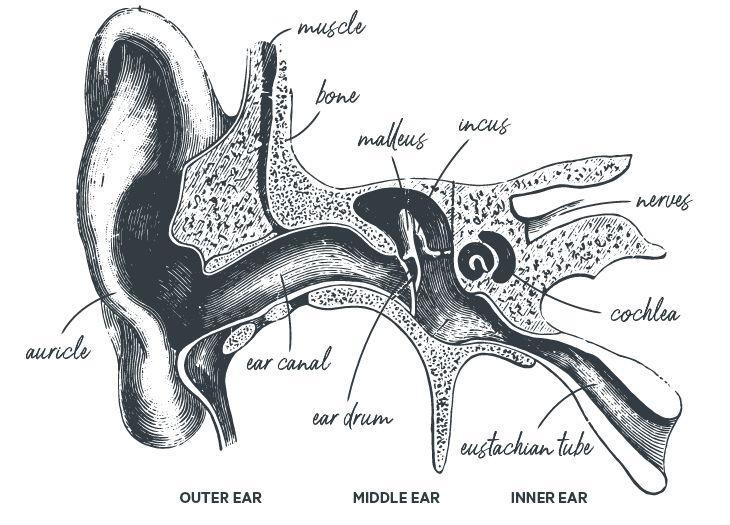Maintaining Optimal Ear Health
What is Hearing Loss?
It is a reduction of our ability to hear, which can happen suddenly or progressively, over a period of time. Many people experience gradual hearing loss over time and as they grow older, refer to a presbycusis.
What are the Types of Hearing Loss?
People can experience natural hearing loss over a long period of time (presbycusis) or an incident, such as an accident or brain injury, can produce a fast decline in a short period of time.
There are two distinct types of hearing loss:
– Conductive
– Sensorineural

Conductive Hearing Loss
Conductive hearing loss is related to a mechanical issue in the actual structure of the ear.
Symptoms of conductive hearing loss:
– May only hear sounds faintly and with lowering sound levels
– There may be the sensation of pain or pressure in either/both ears
– Specific difficult hearing conversation
– Awareness their own speech sounds different
– Hearing from one ear over the other is easier to hear out
Most often this problem is centred near the external ear (ear canal & middle ear) which is a combination of tympanic membrane (eardrum) and ossicles (the small bones behind the eardrum).
Other causes of conductive hearing loss can include:
– Otosclerosis; abnormal bone growth in the middle ear
– Earwax build-up in the eardrum
– Middle ear temporary infection
– Fluid build-up in the middle ear
Surgery can sometimes be a remedy, however even with surgical intervention the sufferer’s hearing capacity may be impacted and a hearing aid technology option can be a solution for improving hearing.
In some cases, hearing aids have been proven to be a great option for restoring or improving ability to hear for people suffering conductive hearing loss.
Sensorineural Hearing Loss
It is the type of hearing loss, which is permanent, and can affect the cochlea and sometimes the auditory nerve responsible for transmitting the sound information to the brain. It has been previously known as nerve deafness.
Sensorineural hearing loss is where:
– There is a problem in the inner ear (cochlear and associated organs)
– It can also be caused by issues with the nerves that maintain the hearing centre of the brain (vestibulocochlear nerve, known as auditory nerve)
Sensorineural hearing loss can often mean that sounds will appear loud enough, however there will still be difficulty understanding what they mean. This type of hearing loss can affect a single ear or both and in the majority of cases hearing devices are the best solution. In the case of profound hearing loss a cochlear implant may be required.
Symptoms of sensorineural hearing loss include:
Tinnitus – the sensation of ringing noises which cannot be heard by other people not caused by external sound in either or both ears.
Muffled hearing – ears feel clogged as sounds are not clear.
Vertigo – sensation the individual or the environment around them is moving or spinning.
Nausea – sensation of wanting to vomit.
There are two types of sensorineural hearing loss:
- Sudden Sensorineural Hearing Loss (SSHL) which is a disease of the ear condition that results in a quick decline in the capacity to hear. This can be caused by a cochlear infection or micro tears within the ear often the result of a blow to the head.
- Noise-Induced Hearing Loss (NIHL), associated with exposure to loud noises over a period of time.
Sensorineural hearing loss can also be caused by:
– Exposure to drugs or chemicals
– An unhealthy diet
– Autoimmune diseases
– Diabetes or tumours
– Multiple sclerosis
– Individual genetic factors

